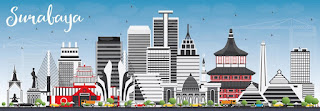Trends in Public Transportation Development: Case on Congestion without Solution in Surabaya-Indonesia
The city of Surabaya has a strategic position as a center of political economy and cultural activities which causes its people to need comfortable and safe transportation to carry out their activities. With a population of approximately 3.2 million people, the city continues to develop infrastructure to provide convenience for its residents, so it is no wonder that the Surabaya city government immediately realizes the construction of mass public transportation in the form of monorail and tram in 2014 until now. The construction of monorails and trams as a rational option for the increasing use of cars and motorcycles. It is even anticipated that in 2018 the main roads in Surabaya will be filled with private vehicles.
 |
| Courtesy of Freepick.com |
Implementation of the fast mass public transportation plan in the city of Surabaya as a structuring system based on rational values, namely: (1) reforming the monorail/tram public transportation system and the culture of using public transportation; (2) provide more reliable, high-quality, equitable and sustainable services in the city of Surabaya; (3) provide medium and long term solutions to problems in the public transport sector; (4) implementing an approach and outreach mechanism to stakeholders, and an integrated transportation system; (5) accelerate the implementation of the monorail and tram network systems according to practical aspects, the ability of the community to accept the system, and the ease of implementation; (6) develop a sustainable institutional structure and (7) develop public service institutions with financial management based on good corporate governance, accountability and transparency.
In a big city like Surabaya, the development of roads and infrastructure is an absolute condition to support the city's economic growth. The density of roads and other transportation infrastructure in the city is too low to support the growth needed in economic activity to ensure the standard of living of the population. The needs of passenger transportation in Surabaya are met with a number of modes of transportation, but many people still use collective transportation, especially city buses which are managed by DAMRI, Surabaya Government by Suroboyo Bus and private and city transportation. The declining performance and reliability of public buses together with the economic reforms contributed greatly to the substantial increase in the use of private vehicles.
The choice of the most appropriate intervention in the city of Surabaya will largely depend on the development of existing infrastructure, settlement patterns, industrial and trade activities, culture, and on the economic and social benefits to the area. Existing infrastructure can influence the choice of intervention, such as in the case of the construction of a Bus Rapid Transit which was rejected by the local government of Surabaya or due to insufficient road network for the bus way (exclusive busway lane), as has been implemented in DKI Jakarta, Bandung, Bogor, Yogyakarta, Batam, and other cities.
The culture of people using cars is a relevant choice because the government does not provide safe, secure and timely public transportation. The flexibility and spontaneity of traveling by private car gives people greater control over the use of time and provides tools to access more options for getting to their destination.
Implementing policies to adapt an environmentally friendly transportation agenda should be seen as part of a pro-environment policy intervention package. Achieving the desired results requires a combination of technology and policy options that improve the performance of the transportation system with a low impact on the environment (air pollution). There are some serious obstacles in implementing the policy because its success depends on the will of a number of stakeholders. The commitment of the government and a number of institutions is needed, because environmental issues will compete with several other interests. Institutions dealing with transportation issues in Surabaya need to reform to address this challenge. Traditionally, transportation and the environment are sectors that have clear targets, orientations, and human resources. Persuading certain actors to accept these changes is an impediment to implementation.


Komentar
Posting Komentar